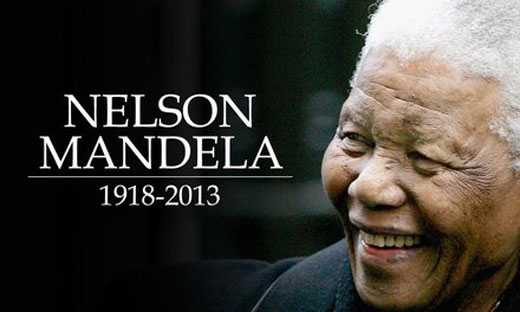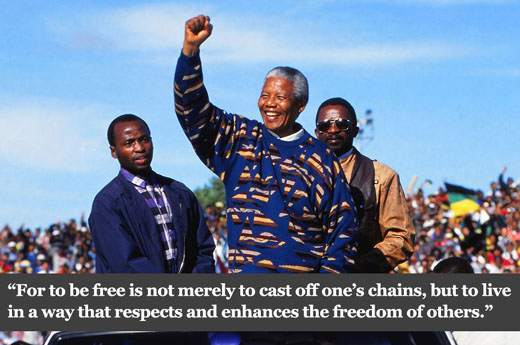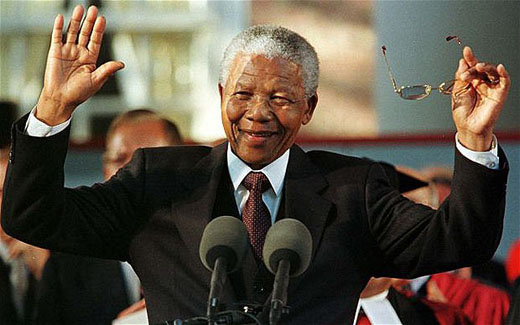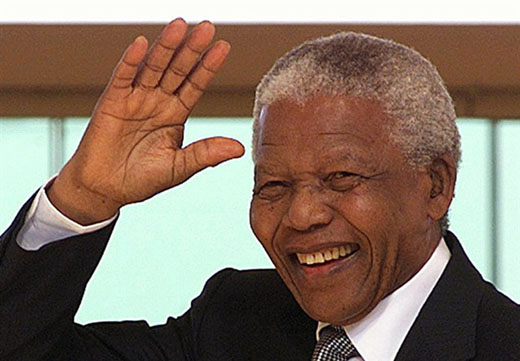Nelson Mandela - a rarity among revolutionaries and moral dissidents
Nelson Mandela - a rarity among revolutionaries and moral dissidents
mangaloretoday.com
Bill Keller, Dec 6, 2013, New York Times : South African anti-apartheid hero Mandela died peacefully at home in Johannesburg at the age of 95 on Thursday after months fighting a lung infection, leaving his nation and the world in mourning for a man revered as a moral giant.
After leaving the presidency, he brought his moral stature to bear elsewhere around the world.
Nelson Mandela led the emancipation of South Africa from white minority rule and served as his country’s first black president, becoming an international emblem of dignity and forbearance. His quest for freedom took him from the court of tribal royalty to the liberation underground to a prison rock quarry to the presidential suite of Africa’s richest country. And then, when his first term of office was up, unlike so many of the successful revolutionaries he regarded as kindred spirits, he declined a second term and cheerfully handed over power to an elected successor.
The question most often asked about Mandela was how, after whites had systematically humiliated his people, tortured and murdered many of his friends, and cast him into prison for 27 years, he could be so evidently free of spite.The government he formed when he finally won the chance was an improbable fusion of races and beliefs, including many of his former oppressors.

When he became president, he invited one of his white wardens to the inauguration. Mandela overcame a personal mistrust bordering on loathing to share both power and a Nobel Peace Prize with the white president who preceded him, F W de Klerk. And as president, from 1994 to 1999, he devoted much energy to moderating the bitterness of his black electorate and to reassuring whites with fears of vengeance.
The explanation for his absence of rancor, at least in part, is that Mandela was that rarity among revolutionaries and moral dissidents: a capable statesman, comfortable with compromise and impatient with the doctrinaire. When the question was put to Mandela in an interview for this obituary in 2007 - after such barbarous torment, how do you keep hatred in check? - his answer was almost dismissive: Hating clouds the mind. It gets in the way of strategy.
Leaders cannot afford to hate. In his five years as president, Mandela, though still a sainted figure abroad, lost some lustrer at home as he strained to hold together a divided populace and to turn a fractious liberation movement into a credible government.
Less attentive
Some blacks – including Winnie Madikizela-Mandela, Mandela’s former wife, who cultivated a following among the most disaffected blacks – complained that he had moved too slowly to narrow the vast gulf between the impoverished black majority and the more prosperous white minority. Some whites said he had failed to control crime, corruption and cronyism. Undoubtedly Mandela had become less attentive to the details of governing, turning over the daily responsibilities to the deputy who would succeed him in 1999, Thabo Mbeki. But few among his countrymen doubted that without his patriarchal authority and political shrewdness South Africa might well have descended into civil war long before it reached its imperfect state of democracy.
After leaving the presidency, Mandela brought that moral stature to bear elsewhere around the continent, as a peace broker and champion of greater outside investment.

Mandela was deep into a life prison term when he caught the notice of the world as a symbol of the opposition to apartheid, literally “apartness” in the Afrikaans language - a system of racial gerrymandering that stripped blacks of their citizenship and relegated them to reservation-style “homelands” and townships.
Around 1980, exiled leaders of the foremost anti-apartheid movement, the African National Congress, decided that this eloquent lawyer was the perfect hero to humanize their campaign against the system that denied 80 per cent of South Africans any voice in their own affairs. Mandela noted with some amusement in his 1994 autobiography, “Long Walk to Freedom,” that this congregation made him the world’s best-known political prisoner without knowing precisely who he was.In South Africa, though, and among those who followed the country’s affairs more closely, Nelson Mandela was already a name to reckon with.He was born Rolihlahla Mandela on July 18, 1918, in Mvezo, a tiny village of cows, corn and mud huts in the rolling hills of the Transkei, a former British protectorate in the south.
His given name, he enjoyed pointing out, translates colloquially as “troublemaker.” He received his more familiar English name from a teacher when he began school at age 7. His father, Gadla Henry Mphakanyiswa, was a chief of the Thembu people, a subdivision of the Xhosa nation.“The first thing to remember about Mandela is that he came from a royal family,” said Ahmed Kathrada, an activist who shared a prison cellblock with Mandela and was part of his inner circle. “That always gave him a strength.”

The enlarging of Mandela’s outlook began at Methodist missionary schools and the University College of Fort Hare, then the only residential college for blacks in South Africa. Mandela said later that he had entered the university still thinking of himself as a Xhosa first and foremost, but left with a broader African perspective. Studying law at Fort Hare, he fell in with Oliver Tambo, another leader-to-be of the liberation movement.
On returning to his home village, he learned that his family had chosen a bride for him. Finding the woman unappealing and the prospect of a career in tribal government even more so, he ran away to the black metropolis of Soweto. There he was directed to Walter Sisulu, who ran a real estate business and was a spark plug in the African National Congress. Sisulu looked upon the tall young man with his aristocratic bearing and confident gaze and, he recalled in an interview, decided that his prayers had been answered. Mandela soon impressed the activists with his ability to win over doubters. “His starting point is that ’I am going to persuade this person no matter what,’” Sisulu said.
Generational takeover
“That is his gift. He will go to anybody, anywhere, with that confidence.”Mandela, though he never completed his law degree, opened the first black law partnership in South Africa with Tambo. Impatient with the seeming impotence of their elders in the African National Congress, Mandela, Tambo, Sisulu and other militants organized the ANC Youth League and engineered a generational takeover. During his years as a young lawyer in Soweto, Mandela married a nurse, Evelyn Ntoko Mase, and they had four children, including a daughter who died at 9 months.
But the demands of his politics kept him from his family. The marriage grew cold and ended with abruptness. “He said, ’Evelyn, I feel that I have no love for you anymore,’” his first wife said in an interview for a documentary film. “’I’ll give you the children and the house. “’Not long afterward, a friend introduced him to Nomzamo Winifred Madikizela, a stunning and strong-willed medical social worker 16 years his junior. Mandela was smitten, declaring on their first date that he would marry her. He did so in 1958, while he and other activists were in the midst of a marathon trial on treason charges.

In 1961, with the patience of the liberation movement stretched to the snapping point by the police killing of 69 peaceful demonstrators in Sharpeville township the previous year, Mandela led the African National Congress onto a new road of armed insurrection.It was an abrupt shift for a man who, not many weeks earlier, had proclaimed nonviolence an inviolable principle of the ANC. He later explained that forswearing violence “was not a moral principle but a strategy; there is no moral goodness in using an ineffective weapon.”
Mandela became the first commander of a motley liberation army, grandly named Umkhonto we Sizwe, or Spear of the Nation. South Africa’s rulers were determined to put Mandela and his comrades out of action. In 1963, Mandela and eight other ANC leaders were charged with sabotage and conspiracy to overthrow the state – capital crimes. It was called the Rivonia trial, for the name of the farm where the defendants had conspired. At Mandela’s suggestion, the defendants, certain of conviction, set out to turn the trial into a moral drama that would vindicate them in the court of world opinion. They admitted that they had engaged in sabotage and tried to lay out a political justification for these acts.
The four-hour speech with which Mandela opened the defence’s case was one of the most eloquent of his life. “I have fought against white domination, and I have fought against black domination,” he told the court. “I have cherished the ideal of a democratic and free society in which all persons will live together in harmony and with equal opportunities. It is an ideal for which I hope to live for and to see realized. But my lord, if it needs be, it is an ideal for which I am prepared to die.”Under considerable pressure from liberals at home and abroad (including a nearly unanimous vote of the United Nations General Assembly) to spare the defendants, the judge acquitted one and sentenced Mandela and the others to life in prison.
Mandela was 44 when he was manacled and put on a ferry to the Robben Island prison. He would be 71 when he was released. Robben Island, in shark-infested waters about seven miles off Cape Town, had over the centuries been a naval garrison, a mental hospital and a leper colony, but it was most famously a prison. For Mandela and others, Robben Island was a university. He honed his skills as a leader, negotiator and proselytizer, and not only the factions among the prisoners but also some of the white administrators found his charm and iron will irresistible.Perhaps because Mandela was so revered, he was singled out for gratuitous cruelties by the authorities. Friends say his experiences steeled his self-control and made him, more than ever, a man who buried his emotions deep, who spoke in the collective “we” of liberation rhetoric. Still, Mandela said prison tempered any desire for vengeance by exposing him to sympathetic white guards, and to moderates within the National Party government who approached him in hopes of opening a dialogue.
Above all, prison taught him to be a master negotiator. Mandela’s decision to begin negotiations with the white government was one of the most momentous of his life, and he made it without consulting his comrades, knowing full well that they would resist. In the last months of his imprisonment, as the negotiations gathered force, he was relocated to Victor Verster Prison outside Cape Town, where he lived in a warden’s bungalow. From the moment they learned of the talks, Mandela’s allies in the ANC were suspicious, and their worries were not allayed when the government allowed them to confer with Mandela. Mandela explained to them his view that the enemy was morally and politically defeated, with nothing left but the army, the country ungovernable. His strategy, he said, was to give the white rulers every chance to retreat in an orderly way.
- ’Satan’s Last Stronghold’ - US Man wrote before death on Andaman Island
- Net neutrality debate rages on; expert panel report by mid-May
- Rich and Mighty Get Away Lightly for Rash Driving, Says Supreme Court
- US may be indirectly funding religious conversion in India
- India Once Again Awakens To Freedom
- RTI query results in Rs 1.87 cr recovery from toll operator
- How To Handle Cell phones and Your Children: Some Basic Advice
- D K Ravi’s Death No more Mistery
- Modi And The Paradox Of The Middle-Class Millennials
- As a Christian, suddenly I am a stranger in my own country, writes Julio Ribeiro
- Beef Ban: What Are The Cows Really Getting Out Of It?
- Are all men womanizers? This video will change your opinion forever
- Mangaluru: DK Congress holds fasting satyagraha against MGNREGA amendments
- Mangaluru student arrested for sending obscene messages, blackmailing women in Bhatkal
- Operation against drug peddlers will continue till the last peddler is arrested: Police Commissioner
- Sullia: Man sentenced to 5 years in prison for sexually harassing minor
- Adria Cardoza’s Manch Pravesh: A Soulful Odissi journey rooted in tradition and devotion
- DK BJP workers celebrate as Nitin Nabin takes charge as national president
- Kapu: Fisherman dies after falling into sea from boat
- Sullia: Bike skids off road at curve near Bellare; youth killed, father critically injured
- Karnataka revises SSLC preparatory exam timetable to curb question paper leaks
- Kasargod: Two killed, three critically injured in car–lorry collision on NH
- Puttur: Retired headmaster dies after falling from coconut tree
- Puttur: 106 kg of ganja seized; two arrested
- Mangaluru: Man defrauded of Rs 1.38 crore in stock market scam
- Sabarimala gold loss case: Kerala court grants bail to prime accused Unnikrishnan Potti
- Bengaluru: Man arrested for stealing women’s innerwear, filming selfies in them
- Cigarette in hand, driving at 120 kmph: 4 teens die in Udaipur car crash
- Sunita Williams retires from NASA after 27 years, three missions and record 608 days in space
- Security tightened in Puri Jagannath Temple after social media post threatens bomb attack
- ‘Can’t push it anymore’: Olympic medallist Saina Nehwal announces retirement from badminton
- Nitin Nabin takes charge as BJP’s youngest Chief, replacing JP Nadda
- Paper ballots to return to Bengaluru civic polls after 25 years
- Karnataka top police K Ramachandra Rao suspended over alleged viral sleazy videos
- Case against woman after Kerala man dies by suicide over her assault charge
- Sabarimala gold heist: ED raids 21 locations in Kerala, Karnataka, TN
- Play In India Or Risk Removal: ICC gives T20 World Cup ultimatum to Bangladesh
- CITY INFORMATION
- TRAVEL
- TOURIST INFORMATION
- HEALTH CARE
- MISCELLANEOUS




 Write Comment
Write Comment E-Mail To a Friend
E-Mail To a Friend Facebook
Facebook Twitter
Twitter  Print
Print 

